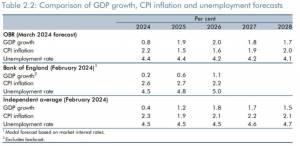As with all investing, your capital is at risk. The value of your portfolio with Moneyfarm can go down as well as up and you may get back less than you invest. Tax treatment depends on your individual circumstances and may be subject to change in the future. If you are unsure investing is the right choice for you, please seek financial advice.
This week, Chancellor Jeremy Hunt unveiled his plans to boost the British economy in what’s believed to be the last large fiscal event before the next general election is called. Many commentators now believe that Sunak’s government will call for the next GE sometime in the Autumn, with many predicting September as the possible date.
So, what are the key things to note from this year’s Spring Budget? Here’s our summary.
Inflation on track, improving growth
On the macroeconomic side, Hunt started by announcing that the latest figures from the Office for Budget Responsibility (OBR) show that inflation is on track to fall below the Bank of England’s 2% target in just a few months’ time. While on growth, today’s OBR forecast shows growth to be around 0.8% in 2024, rising to 1.9% in 2025, beating many expectations.
Moneyfarm’s Chief Investment Officer, Richard Flax, commented: “The table below shows the OBR Economic and Fiscal Outlook in March 2024. It compares the OBRs forecasts against the Bank of England and an average of independent forecasters.”

“The OBR forecasts paint a rosier picture than the Bank of England and the private sector,” Richard continued. “The OBR sees faster growth both for 2024 and beyond, along with significantly lower inflation. Making economic forecasts is a difficult task, to say it kindly. But it’s fair to say that the OBR’s macro assumptions would likely be more supportive of the government’s fiscal plans than those of the Bank of England or the private sector. Stronger GDP growth, lower inflation and lower unemployment should translate into higher tax receipts and, possibly, lower government expenses. Had the government used alternative forecasts, its fiscal headroom would likely have proven smaller.”
Chancellor announces a 2p cut to National Insurance
As was widely touted before the announcement, Chancellor Hunt announced a 2p cut to National Insurance payments. This is on top of the 2% announced in August of last year, giving people a little more money in their pocket to spend, save or invest.
Research from the Telegraph suggests that someone who earns £35,000 a year should save around £785 on average.
Hunt argues that NI represents a ‘double tax’ on workers and stated the Conservatives’ ultimate goal was to eliminate NI altogether. However, many analysts believe this to be an unrealistic aspiration given the vast amount it contributes towards public expenditure. As forecast for 2023/24, National Insurance contributions are estimated to amount to £172.3 billion, which represents 16.3% of the total tax take.
Chris Rudden, Head of Investment Consultants UK said: “Whilst expected, the 2% cut in NI will be warmly received. This is a great measure for putting more money into workers’ pockets and allowing them more freedom to either spend, save or invest. However, one thing to be cautious about is that the National Insurance has traditionally funded the state pension. With recent scrutiny on the size of state pension spending and now the reduction in funding, this raises further questions about its sustainability. As a result, we continue to call for individuals to make more personal contributions to take greater control over their financial future and ensure they have the retirement they deserve.”
Introduction of a new ‘British ISA’
The most notable announcement of this year’s Spring Budget, in our view, was the launch of a potential ‘British ISA’. This would enable savers to invest £5,000 tax-free into UK assets. The full details are still to be set out, but we think any rise in the tax-free allowance is an obvious benefit to savers.
That being said, we maintain our commitment to a globally diversified approach to investing, Being well-diversified across multiple asset classes and regions is one of the best ways to mitigate risk, especially where ‘home bias’ is concerned. We feel that we’re able to better reduce clients’ risk exposure through this approach.
However, any rise on the tax-free cap, which has been in place since 2017, is of course welcome. But we need to look more closely at the details of the ‘British ISA’ to better understand the potential pros and cons for investors, and how it fits into our Moneyfarm offering, whether through one of our professionally managed portfolios or our share investing platform. We hope to keep you updated as soon as more detail becomes available.
A ‘pension for life’
The average UK resident has 11 different jobs during the course of their working life, which can soon add up to a lot in ‘lost’ contributions. That figure now stands at a staggering £19 billion in the UK alone, according to recent research from The Association of British Insurers (ABI). More than 1.6 million Brits are thought to be affected, with each missing pot worth an average of £13,000, according to the same research.
This makes it clear to us that simplifying the workplace pension system is long overdue, as we believe people should take control of their pension pots to create an investment and saving strategy that aligns more closely with their retirement goals.
Although we’re still short on detail from the Chancellor, we would welcome any new measures that simplify the retirement planning process and make pension pots more manageable. That being said, we would strongly advise clients not to wait until further details become available and to take action in consolidating their existing workplace pension pots, which you can do already.
Consolidation helps clients to better manage all their retirement savings in one place where they can better monitor performance and have an overall picture of where they are on their investment journey.
“The chancellor briefly outlined a move closer to the pot for life, which we welcome. Anything that incentivises people to take more control of their retirement is great. We look forward to more details coming out,” notes Chris Rudden. “Until further details come out, we encourage people to still take the initiative and make sure they are fully aware of their pension situation. Consolidating your pensions into one place is still possible and we encourage this as a way to help to plan your retirement better and can reduce your costs.”
If you’d like to talk through your options, then a member of our team will be happy to help you simplify your retirement planning. You can book an appointment with us at any time or contact us via phone, email or live chat.
In other news
Finally, in what is good news for motorists, the Chancellor also announced the continuation of the 5p freeze on fuel duty for a further 12 months. This, he says, will save motorists £50 a year on average.
Alcohol duty was also frozen, before it was due to rise in August. This, the Chancellor believes, will help 38,000 pubs in the UK.
Hunt also committed to scrapping so-called ‘non-dom’ status, a move that former Chancellor George Osborne suggests is a potential fiscal ‘mine’ for a prospective new Labour government. The new move won’t come into effect until April 2025 but is expected to raise around £2.7bn extra in tax revenue.
As always, we remain committed to providing you with the latest news, our views and information about how we can help you navigate the financial landscape to your best advantage. You can book an appointment with us at any time or contact us via phone, email or live chat, and we’ll be happy to help.
 Richard Flax: Richard is the Chief Investment Officer at Moneyfarm. He joined the company in 2016. He is responsible for all aspects of portfolio management and portfolio construction. Prior to joining Moneyfarm, Richard worked in London as an equity analyst and portfolio manager at PIMCO and Goldman Sachs Asset Management, and as a fixed-income analyst at Fleming Asset Management. Richard began his career in finance in the mid-1990s in the global economics team at Morgan Stanley in New York. He has a BA from Cambridge University in History, an MA from Johns Hopkins University in International Relations and Economics, and an MBA from Columbia University Graduate School of Business. He is a CFA charterholder.
Richard Flax: Richard is the Chief Investment Officer at Moneyfarm. He joined the company in 2016. He is responsible for all aspects of portfolio management and portfolio construction. Prior to joining Moneyfarm, Richard worked in London as an equity analyst and portfolio manager at PIMCO and Goldman Sachs Asset Management, and as a fixed-income analyst at Fleming Asset Management. Richard began his career in finance in the mid-1990s in the global economics team at Morgan Stanley in New York. He has a BA from Cambridge University in History, an MA from Johns Hopkins University in International Relations and Economics, and an MBA from Columbia University Graduate School of Business. He is a CFA charterholder.
 Chris Rudden, Head of Investment Consultants UK: Chris is passionate about blending technology and human expertise to help people make better investment decisions to secure their financial future. With a keen interest in the impact macro economics has on investments, Chris has been at Moneyfarm for over 7 years now and is a chartered financial analyst with the CFA society.
Chris Rudden, Head of Investment Consultants UK: Chris is passionate about blending technology and human expertise to help people make better investment decisions to secure their financial future. With a keen interest in the impact macro economics has on investments, Chris has been at Moneyfarm for over 7 years now and is a chartered financial analyst with the CFA society.
*As with all investing, financial instruments involve inherent risks, including loss of capital, market fluctuations and liquidity risk. Past performance is no guarantee of future results. It is important to consider your risk tolerance and investment objectives before proceeding.





